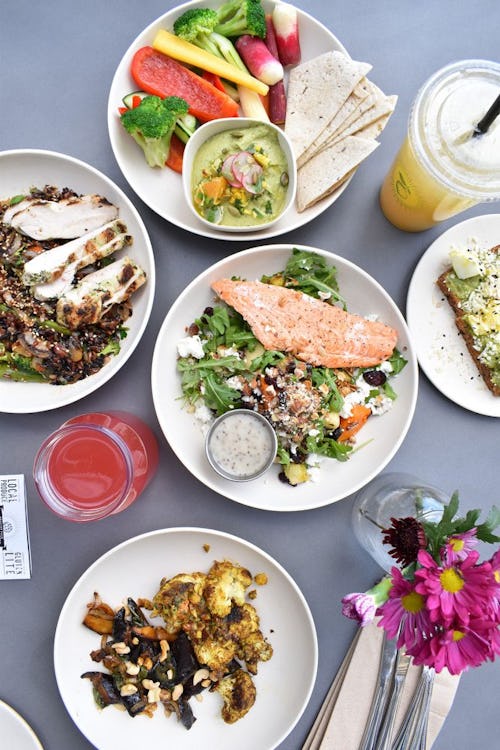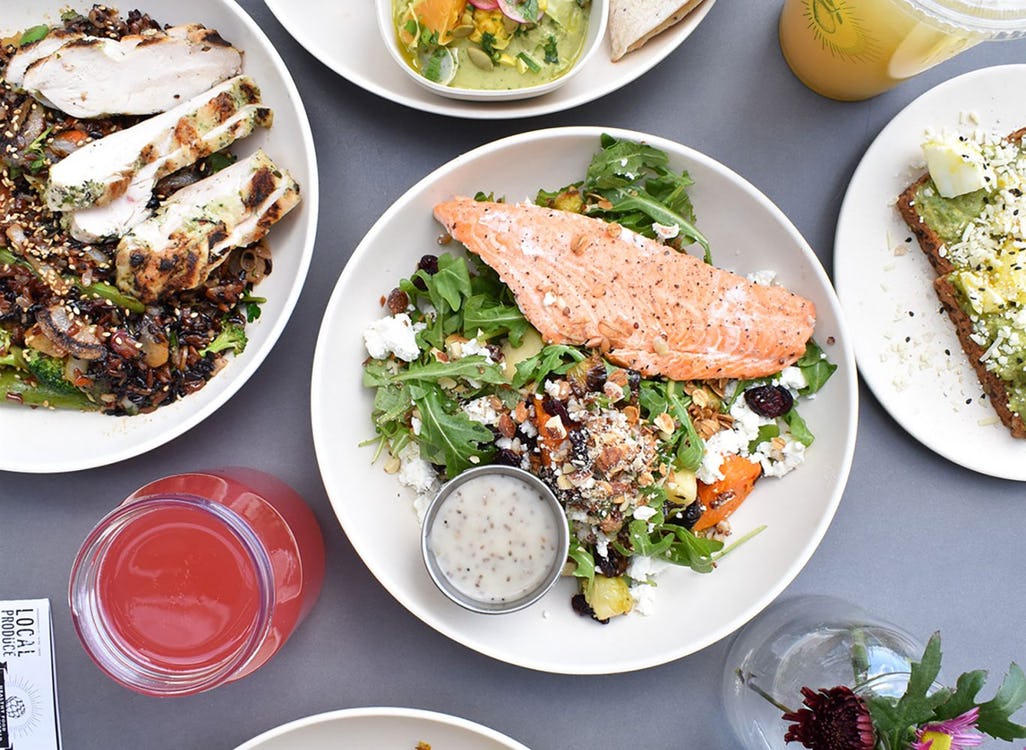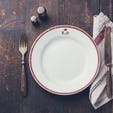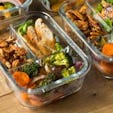As far as meals go, lunch is generally low on the priority list. Unless you like fasting, or are already pretty dialed in your nutrition, what to eat for lunch isn’t generally the first thing on your mind as you’re getting ready for the day—especially if you’re trying to get your kids ready. Who has time to fix a sandwich if the bus is around the corner and Sally can’t find her damn shoes and won’t brush her teeth?
We’ve all been there: You get to work, get dialed in, and the next thing you know it’s lunchtime. If you were together during the weekend, or thought about lunch before you left your house, you may have brought it with you. If, however, you had a busy morning or aren’t in the habit of prepping food, well, you’re probably left to scrounge the office for snacks, make a stop at a fast-food joint, or beg your coworkers to share.
As fun as it might be to have a lunchtime adventure every day, it’s healthier if you can build some time in your day or week to prepare lunch for yourself. Moreover, if you can prepare lunch that includes at least 20 grams of protein, you’ll set yourself up for a much more productive afternoon.
Benefits of a High Protein Lunch

Although it might take a little bit of preparation, eating a healthy, high-protein lunch is the right call for most people. Eating protein in the middle of the day will help you:
- Build and maintain muscle
- Maintain a healthy body weight
- Feel sated so you’re less likely to overeat at dinner
Most of us could do with eating more vegetables and more protein. Your goal for just about every meal should be to get somewhere between 20-35 grams of protein and one cup of vegetables.
How to Add Low-Fat, High Protein Foods to My Meal
If you have the ability to store food at your workplace, stock up with some of these low-fat, high-protein food options:
- Cans/ containers of tuna fish
- Lunch meat such as uncured ham, sliced turkey, roast beef
- Low-fat plain Greek yogurt
- Low-fat cottage cheese
- Jerky
- Protein shake, bites, or bars
Keeping easy, high-protein foods on hand is a great way to add protein to your lunch, especially if you haven’t had a lot of time to meal prep. Throw these in the fridge or in your desk drawer and you’ll always have something healthy you can count on.
High protein lunch idea #1: Adult Lunchable
Lunchables were great when we were kids. Make an adult version that will bring you the same joy without the, uh, gross factor. Choose a protein and a couple of sides. We suggest a dipping sauce made from high-protein Greek yogurt.
- 2-3 hard boiled eggs or your favorite jerky (18g P)
- Fresh veggies with Greek yogurt dip (10 g P)
- Crackers
High protein lunch idea #2: Turkey Wrap
Ditch the slices of bread for a tortilla instead. Pile the turkey high and add your favorite condiments to personalize your wrap just how you like it.
- 4 slices of turkey (24g P)
- High-protein tortilla (7g P)
- 1 slice of cheese (7g P)
- 1 cup spinach
- Mayo/mustard
High protein lunch idea #3 (Vegan): Quinoa Bowl
Vegetarians and vegans need protein, too! A quinoa bowl is one of the best ways to do it. Quinoa is a complete protein, which means it contains all 9 essential amino acids. Add your favorite lentils and veggies to the top for extra protein, vitamins, and minerals.
- 1 cup Quinoa (9g P)
- ½ cup lima beans (8g P)
- ½ cup black beans (5g P)
- ⅓ cup cucumber, chopped
- ⅓ cup cherry tomatoes, halved
How to Meal Prep for the Week?
For most of us, the most difficult part of making good nutrition decisions is because we feel like we just don’t have time to prepare for the week. It may seem easier to just go out to lunch every day, but if you can build the habit of spending a few hours a couple times during the week to prepare for at least the next 2-3 days, you’ll find those weekday lunches are less stressful. Building a healthy habit like preparing your lunches can also help you meet your athletic goals, whether they’re based on performance or aesthetics.
Implement some of the following tips to make your meal prep easier :
Turn Sundays into cooking days
Sundays are great for meal preparation because they’re generally the least busy for most of us. If you can, use a couple hours on Sunday to prepare meals for the next 2-3 days. Pop those tupperware containers in the fridge, and then you can grab and go on those busy mornings.
Make Extra Dinner
One of the easiest ways to “prep” a lunch for the following day is to make more dinner than you need. Cook an extra steak, an extra cup of rice, or bake an extra potato. If you can get 1-2 more servings out of the dinner you cook, you can put the extra away for an easy (and delicious) lunch the next day.
Make Single-Pan Meals
Low on time? Not a problem. Grab chicken thighs, potatoes, onions, and peppers. If you have all these ingredients, some olive oil, and a baking pan, you’re set. Turn the oven to 400 degrees F, put your fave meat and vegetables on the pan, and cook. The trick is to season your meat and potatoes/squash and put them in the oven first. Once they’re well on their way to being fully cooked, add your onions and peppers.
Stir-fry, Baby
Stir-frying your favorite meat and vegetables together is another great way to get a high-protein meal without much effort. Same rules apply as above, cook your meat first so you don’t overcook the veggies. If you want, cook rice or noodles separately and then add to the stir-fry when you’re putting the food into containers.
Rotisserie Chicken is Your Friend
Rotisserie chicken is already cooked. All you have to do is shred it, and you have A LOT of chicken ready to eat. Add chicken to some cooked veggies, rice, or potatoes. You can also throw the chicken into tortillas with some beans and cheese for simple tacos.
Chili is a Win
Chili is easy to make, healthy, and really high in protein. A pot of chili can make up to eight servings, depending on how much meat and beans you add. One pot for dinner can feed a family of four for dinner as well as leave you a couple extra meals you can take to work through the week.
Mix Up Your Meals
One way to maintain the habit of meal prep is to mix up what you make and what you eat. If you find yourself eating the same thing over and over, it’s likely you’ll get bored and tired. Bored and tired are not the emotions you want when you’re developing new habits. Make food you’re excited about eating because you know it’s tasty and good for you.

)





